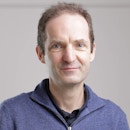Exploring Many-Body Problems With Arrays of Individual Atoms
- Speaker
-
 Antoine Browaeys, Ph.D.Institut d’Optique
Antoine Browaeys, Ph.D.Institut d’Optique
French National Center for Scientific Research (CNRS)
Presidential Lectures are free public colloquia centered on four main themes: Biology, Physics, Mathematics and Computer Science, and Neuroscience and Autism Science. These curated, high-level scientific talks feature leading scientists and mathematicians and are intended to foster discourse and drive discovery among the broader NYC-area research community. We invite those interested in the topic to join us for this weekly lecture series.
Over the last twenty years, physicists have learned to manipulate individual quantum objects, such as atoms, ions, molecules, quantum circuits and electronic spins. Scientists can now build a synthetic quantum computer “atom by atom.” By controlling the interactions between atoms, scientists can study the properties of these elementary many-body systems, including quantum magnetism, transport of excitations and superconductivity, and thus gain a deeper understanding of the N-body problem. More recently, scientists realized that these quantum machines may find applications in industry, such as finding the solution of combinatorial optimization problems.
In this lecture, Antoine Browaeys will present an example of a synthetic quantum system based on laser-cooled ensembles of individual atoms trapped in microscopic optical tweezer arrays. By exciting the atoms to Rydberg states, he and his colleagues can make the atoms interact even at distances of more than 10 micrometers. In this way, they can study the magnetic properties of an ensemble of more than a hundred interacting one-half spins in a regime in which simulations by usual numerical methods are already very challenging. Some aspects of this research led to the creation of a startup called Pasqal.
